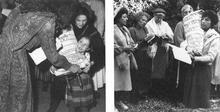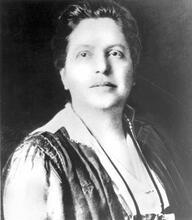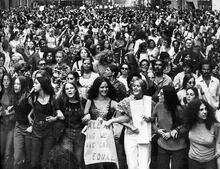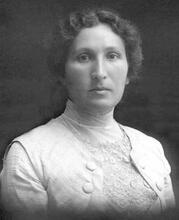Israel Women's Network
Courtesy of a private collection.
The Israel Women’s Network (IWN) was founded in 1984 as a direct outcome of a US-Israel Dialogue held in Jerusalem under the sponsorship of the American Jewish Congress. IWN is responsible for many of the feminist breakthroughs in Israel. The Network continues to support Israeli women fighting discrimination, organize discussion and study groups, and lobby Members of Knesset and other leaders to inculcate the demands of the Network. Since its founding, IWN has conducted research projects, held conferences, and fought to implement policies that would make Israel a more equitable and just country. The success of IWN led to an undesirable degree of politicization. Though lacking some of the glory of its earlier days, the Network remains an active agent in Israeli feminism.
Establishment and Development of the Network
To page through the newsletters and annual reports published periodically by the Israel Women’s Network (IWN) between February 1986 and January 2000 is to become aware of the powerful impact that can be made by a group of well-informed, energetic, articulate, and determined feminists. Combining consciousness-raising, education, litigation, and lobbying, the Israel Women’s Network was responsible for a veritable transformation in the status, image, and self-image of Israeli women that marked the last fifteen years of the twentieth century.
Widely acknowledged as the country’s major advocacy group on women’s status at the end of the twentieth century, the Israel Women’s Network was founded in the summer of 1984 as a direct outcome of a US-Israel Dialogue held in Jerusalem under the sponsorship of the American Jewish Congress. The topic of the four-day encounter (the twentieth such annual dialogue organized by the AJC) was “Woman as Jew, Jew as Woman: An Urgent Inquiry.” The overseas delegation, headed by Betty Friedan, included well-known Jewish feminists, both academics and activists, such as Jewel Bellush of Hunter College, sociologist Cynthia Fuchs Epstein, Blu Greenberg, and Virginia Snitow. Among the thirty-two Israeli participants were sociologist Rivka Bar-Yosef, political scientist Galia Golan, legal expert Frances Raday, and Alice Shalvi, all of the Hebrew University of Jerusalem; sociologist Dafna Izraeli of Tel Aviv University, MK Shulamit Aloni, Yael Dayan, and Colonel (later Brigadier General) Amira Dotan, who was at the time the commanding officer of the IDF Women’s Corps.
At the urging of Betty Friedan, the participants did not content themselves with verbal discussion, but—contrary to the tradition of the dialogues—drew up a series of demands for changes in legislation and practice, which would improve the status of women in Israel and in the North American Jewish community. A three-woman delegation spontaneously appointed by the participants, headed by Alice Shalvi and including Tamar Eshel (Labor) and Yael Rom (Likud), succeeded in presenting their demands to Shimon Peres and Yitzhak Shamir, the heads respectively of the Labor Party and the Likud, who were holding coalition-agreement discussions at the King David Hotel following the recent general elections to the Lit. "assembly." The 120-member parliament of the State of Israel.Knesset. Elated by their success, some of the Israelis decided there and then to establish a non-partisan organization that, unlike the veteran women’s organizations such as Na’amat, WIZO, and Emunah, would focus on advancing women’s status via education and consciousness-raising, legislation, litigation, and general advocacy.
In September 1984, when Alice Shalvi invited the Israeli participants to an informal initial meeting, approximately half of the thirty-two delegates attended. These were soon joined by a number of feminists who had not been at the dialogue. A name was decided on and soon Shalvi became the de facto chairwoman of the organization, which at first operated in a highly informal manner, without formal membership requirements or dues, and with discussions open to all who cared to attend.
Throughout 1985 and much of 1986, public meetings were held in the major cities, in moshavim and A voluntary collective community, mainly agricultural, in which there is no private wealth and which is responsible for all the needs of its members and their families.kibbutzim, both in order to raise awareness of discrimination and in order to establish what were the dominant issues of concern to the country’s female population, both urban and rural, Jewish and non-Jewish. These meetings drew astonishingly large audiences and it rapidly became clear that IWN was fulfilling a much-needed function. The topics that recurred time and again, no matter what the social context, included women’s status in the rabbinical courts (especially the vexing problem of women refused divorce), lack of adequate representation in decision-making forums such as local and national government, lack of equality in the workplace, and the negative image of women projected by the media. Activists within the IWN raised additional issues, such as women’s health, a topic of which most women were at the time not even aware. In general, what emerged was that, despite the strong feelings of discontent, few women were informed on actual data.
The first English-language newsletter, which appeared in February 1986, reported on a series of meetings at which IWN representatives apprised the chief rabbis of the problems women faced in the rabbinical courts that have sole jurisdiction over divorce, as well as of a series of halakhically based solutions to those problems that had been drawn up by a committee of male and female lawyers and rabbis. One of the illustrations in the newsletter showed the line of people at Jerusalem’s main post office who had come to participate in a mass “mail-in” of cards urging the Chief Rabbis to adopt IWN’s proposals.
The newsletter also described a study day on Women in Judaism, held in July 1985 to coincide with the Jubilee Convention of the Rabbinical Council of America, at which workshops dealt with personal status and divorce; women and prayer; Torah she-bi-khetav: Lit. "the written Torah." The Bible; the Pentateuch; Tanakh (the Pentateuch, Prophets and Hagiographia)Torah study for women; and the Image of Women in Jewish Sources. A photograph in the newsletter portrayed the historic meeting between IWN executive members and the majority of the women members of the Knesset—a meeting that marked the beginning of a long and fruitful partnership on women-related legislation. Other items referred to a month of television monitoring designed to scrutinize the image of women projected by Israel television as well as the role (minimal, as it turned out) played by women in creating Israeli programs. Unsurprisingly, the dominant image projected had been the familiar stereotype of homemakers dependent on, and inferior to, their male counterparts. In consequence, IWN had established watchdog committees to scrutinize print and electronic media as well as advertising in order to facilitate prompt responses to discriminatory practices.
There followed a report on IWN’s participation in the 1985 UN conference to mark the End of the Decade of World Women, held in Nairobi. The Network-organized panel on “Mobilizing for Equality,” presented at the NGO Forum that preceded the conference, comprised Bella Abzug, E. M. Broner, and Amina Rahman of the Urban League from the United States, as well as Israelis Galia Golan, Esther Eilam, and (later MK) Naomi Chazan. Immediately upon the return of the Israeli delegation IWN held a “debriefing” of all the Israeli delegates, which was attended by over three hundred women and was in itself an indication of the interest that had been generated by the Network in only one year of activity. Finally, the newsletter announced plans for the future, referring to the report submitted in 1978 by the Commission on the Status of Women headed by MK Ora Namir, which had to all intents and purposes been ignored by the government.
Accomplishments and Aims of the Network
The Israel Women’s Network has:
Updated the findings of the Namir Commission in order to determine what has changed—both for better and for worse—since February 1978.
Adopted the “Forward-Looking Strategies for the Year 2000” adopted at the close of the UN Conference in Nairobi, which should serve as our guidelines for future action.
Identified and defined the most urgent problems which need to be dealt with, in the light of the above documents.
We do and shall continue to:
Train Israeli women to define problems of discrimination which they encounter and to be active in the abolition of such discrimination.
Organize discussion and study groups for consciousness-raising and mutual support.
Organize lobbying of Members of Knesset, heads and members of local councils, women’s organizations and other bodies in order to inculcate awareness of our needs and demands and to induce them to relate to those needs and demands both seriously and sympathetically.
Uniting Men and Women to Make Israel Equitable and Just
Within a surprisingly short time, IWN gained recognition as the country’s major advocacy group on women’s issues, respected for the professional expertise of its board members and, later, of its staff. Meetings with members of Knesset to discuss collaboration on women-related issues and to put IWN’s expertise at the disposal of the legislators became annual events, especially after the 1992 general elections, when several of the eleven women elected were either former board members of IWN (such as Naomi Chazan of Meretz and Yael Dayan of Labor) or had taken political leadership training courses in which the IWN excelled (e.g. Anat Maor of Meretz and Likud member Naomi Blumenthal). The fruitful collaboration that resulted led to the unprecedented crop of new legislation and legislative amendments relating to women (over forty in all) passed by the eleventh Knesset. In addition, the ad-hoc Committee for the Advancement of Women, first headed by Yael Dayan, became a permanent Knesset committee, entitled to present legislative proposals, before the Knesset was dispersed in 1996.
In some cases, the legislation was the result of IWN-initiated litigation (e.g. Naomi Nevo v. The Jewish Agency, which led to the abolition in 1987 of differential retirement age for men and women, even though the Supreme Court ruling was delivered only in 1990); in others, IWN availed itself of existing legislation (e.g. the Equality of Men and Women Act) to initiate litigation, as in the landmark case of Alice Miller v. the Israel Air Force (1995), which resulted in compelling the IAF to accept women into its highly selective pilot training courses.
IWN was less successful, in terms of concrete results, in its dealings with the rabbinical establishment regarding personal status, especially the painful topic of women refused divorce. An ad-hoc advisory committee of rabbis and legal experts that IWN had established proposed a number of halakhically based solutions, ranging from pre-nuptial agreements to annulment, but while the country’s chief rabbis, to whom these proposals were repeatedly submitted, admitted that all the proposals were halakhically acceptable, in practice hardly any reforms were introduced, effectively leaving thousands of women “anchored” in the limbo of non-existing relationships with their “recalcitrant” husbands. However, the broad coalition IWN spearheaded and that included other women’s organizations, and the well-publicized semi-annual demonstrations which the resulting ICAR (International Coalition for Woman who cannot remarry, either because her husband cannot or will not give her a divorce (get) or because, in his absence, it is unknown whether he is still alive.Agunah Rights) held outside the office of the Chief Rabbinate on the Fast of Esther and between The Jewish New Year, held on the first and second days of the Hebrew month of Tishrei. Referred to alternatively as the "Day of Judgement" and the "Day of Blowing" (of the shofar).Rosh Ha-Shanah and The Day of Atonement, which falls on the 10th day of the Hebrew month of Tishrei and is devoted to prayer and fasting.Yom Kippur, did succeed in arousing public awareness of the serious injustice and the human suffering which the abuse of the courts’ power incurred. A film, directed by Augustine Zycher, that graphically presented both the plight of the agunot and the inefficiencies of the religious courts, was screened on Israel Television in 1991.
The very existence of IWN and its readiness to work hand in hand with other organizations, rather than to compete with them, led to significant changes in the organizational culture of the veteran women’s organizations, who gradually abandoned their previous virtually exclusive emphasis on the provision of child care and the welfare of working mothers, in favor of public involvement in politics. Thus WIZO, which for many years had actually prohibited its board members from engaging in party politics, adopted the IWN model of political leadership training, out of an awareness that only women’s active participation in the political (not necessarily partisan) life of the country could ultimately improve their status.
IWN Efforts in Israel
A number of national and international events organized or co-sponsored by IWN were remarkably successful in bringing to public attention topics that had hitherto been ignored or neglected by women’s organizations. Thus, in 1987 the Network hosted an extraordinarily successful one-week International Conference of Women Writers, which was attended by some sixty authors from Europe, North and South America, Australia, Asia, and Africa. The participants, many of whom had not previously been aware of each others’ existence, read from their works of prose and poetry and in two public meetings discussed whether there indeed exists a distinct genre that one may identify as “women’s writing.” Among the fiercest debates was that between Marilyn French of the United States and Israeli Shulamit Hareven, in which the latter hotly contested French’s contention that one can distinguish male from female writing.
More significant for Jewish women was the international conference held in December 1988, in the course of which a considerable number of participants decided to hold a full women’s prayer service, including Torah reading, at the Western Wall in the Old City of Jerusalem, an act that, while not strictly forbidden halakhically, aroused the ire of the Orthodox men praying in the area as well as of those officials of the Ministry of Religious Affairs responsible for maintaining this public space, which many consider the holiest site in Israel. The physical attack on the women proved the beginning of a lengthy legal process in which the Women of the Wall, as the new group came to be called, demanded the right of women to pray wearing Four-cornered prayer shawl with fringes (zizit) at each corner.tallit, singing aloud and reading Torah on Rosh Hodesh (the first day of the Hebrew month), traditionally observed as a minor holiday specifically for women. As of 2005, no wholly satisfactory ruling had been laid down by the Supreme Court.
Research projects initiated and conducted by IWN’s Research and Resource Center, especially during the late 1990s, revealed discrimination against women in the law courts and provided data on women’s health (especially reproductive health), environmental influences, educational disadvantages, and other issues. In some cases, this research formed the basis of reports presented to United Nations conferences (e.g. the Population and Development Conference held in Cairo in 1994), either by IWN itself or by the relevant government agencies.
In 1996 the IWN was the first body to bring to government and public attention the appalling phenomenon of sex trafficking that had penetrated the country. A report based on six months of research conducted by Russian-speaking Martina Vandenberg, a Human Rights Fellow of Columbia University’s School of Law, based at IWN, was presented to the Moscow conference on the trafficking of Russian women organized by the Global Survival Network. Recommendations for eliminating the trafficking were presented to both the Russian and the Israeli governments and women activists were mobilized to ensure the implementation of the recommendations. Vandenberg’s pioneering work was supplemented by a massive public-relations campaign designed to change the negative view of women immigrants from the CIS.
Another of IWN’s projects dealt with eating disorders, an issue of which neither the medical professionals nor women themselves had been sufficiently aware. In this area, too, initial research conducted by members of IWN’s Health Forum led to educational projects, a national conference addressed by overseas experts, media coverage, outreach to various “client” populations and collaboration with the Ministries of Health and Education designed as far as possible to prevent the spread of such disorders by providing essential services.
The hotline on discrimination in the workplace, instituted in 1990 and operated by IWN’s legal staff and specially trained volunteers, provided material for a number of important legal actions. The Health Committee was responsible for official recognition of women’s health as a discrete area for health care. The Education Committee led to the establishment within the Ministry of Education of a body empowered to change curricula, syllabi, and textbooks so as to ensure the inculcation of greater equality. Advocacy in the Knesset ensured continued legislative action on women’s status. A Media Committee monitored advertising, printed and electronic media, recording and protesting sexist reporting and imagery. In short, there was scarcely an area of Israeli life that was not affected in one way or another by IWN activity.
The Women’s Policy Research Center, founded in 1997 with funding from the Ford Foundation and other bodies, significantly increased the number of publications issued by IWN, enhanced their importance, and amplified their impact. In 1997 alone the publications included one on government policy regarding subsidization of child care and its impact on women’s employment; one on the Equal Opportunity for Employment Commission; one on Women and Business Enterprise and another on Equality for Women in Israel’s Welfare Policy. A project conducted by Craig Charney of New York, dealing with the gender gap in voting for local and national government, was intended to empower women voters. It informed a massive campaign conducted by a coalition of women’s organizations spearheaded by IWN to increase the number of women elected to the Knesset in 1999.
The success of IWN, coupled with the way in which it served to propel women into prominence, led to an undesirable degree of politicization. Membership in the executive was perceived as a springboard into the political arena and an unprecedented degree of infighting marred the previous mode of decision-making by consensus.
Alice Shalvi retired as IWN chairwoman at the end of 1997 and was succeeded by attorney Rivka Meller-Olshitsky. When the latter unexpectedly resigned after only one year in office, Shalvi was recalled for a further year, after which Ra’anannah Municipal Council member Rina Bartal was elected to the position. In the interim between Shalvi’s original retirement and her recall a number of key staff members had either been dismissed or had resigned, depriving the Network of their invaluable expertise. At this point IWN relocated from Jerusalem to Ramat Gan, a move that inevitably led to a certain weakening of the relationship with Knesset members. Though lacking some of the glory of its earlier days, it remains an active agent in Israeli feminism.











